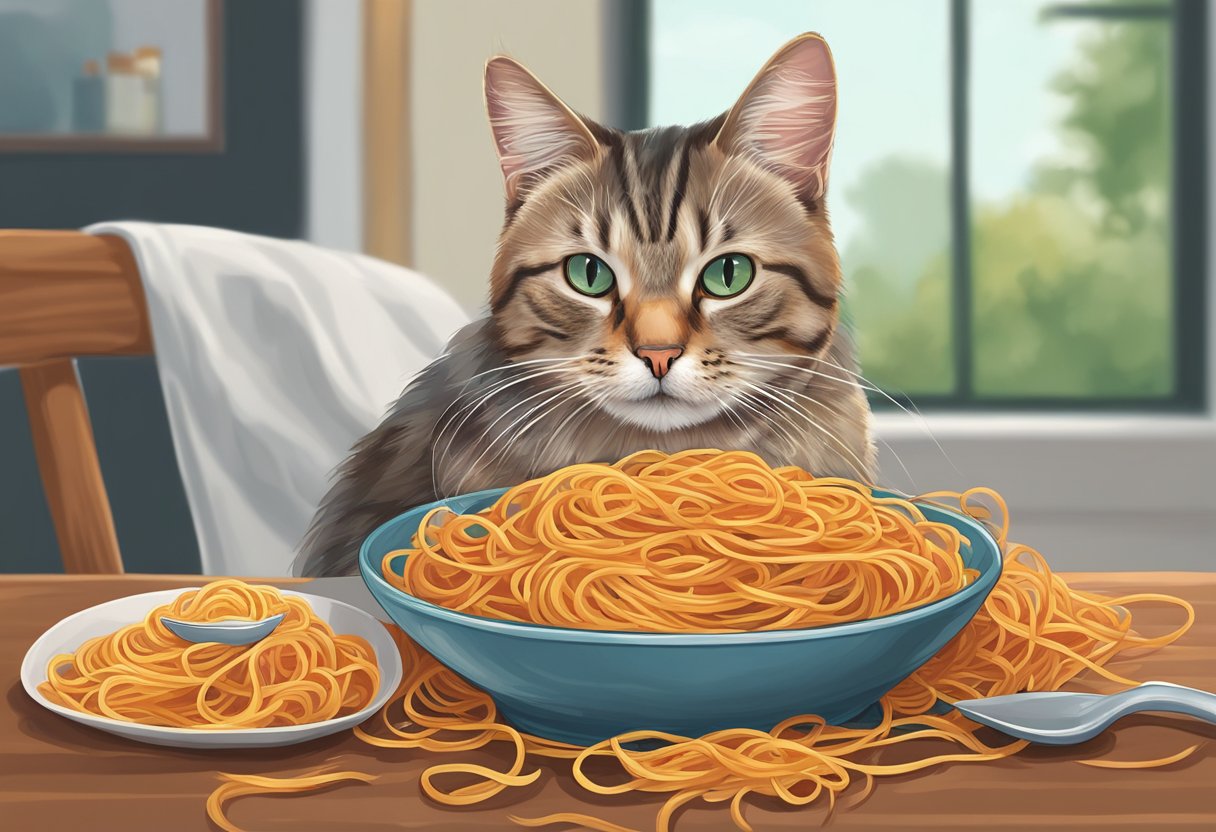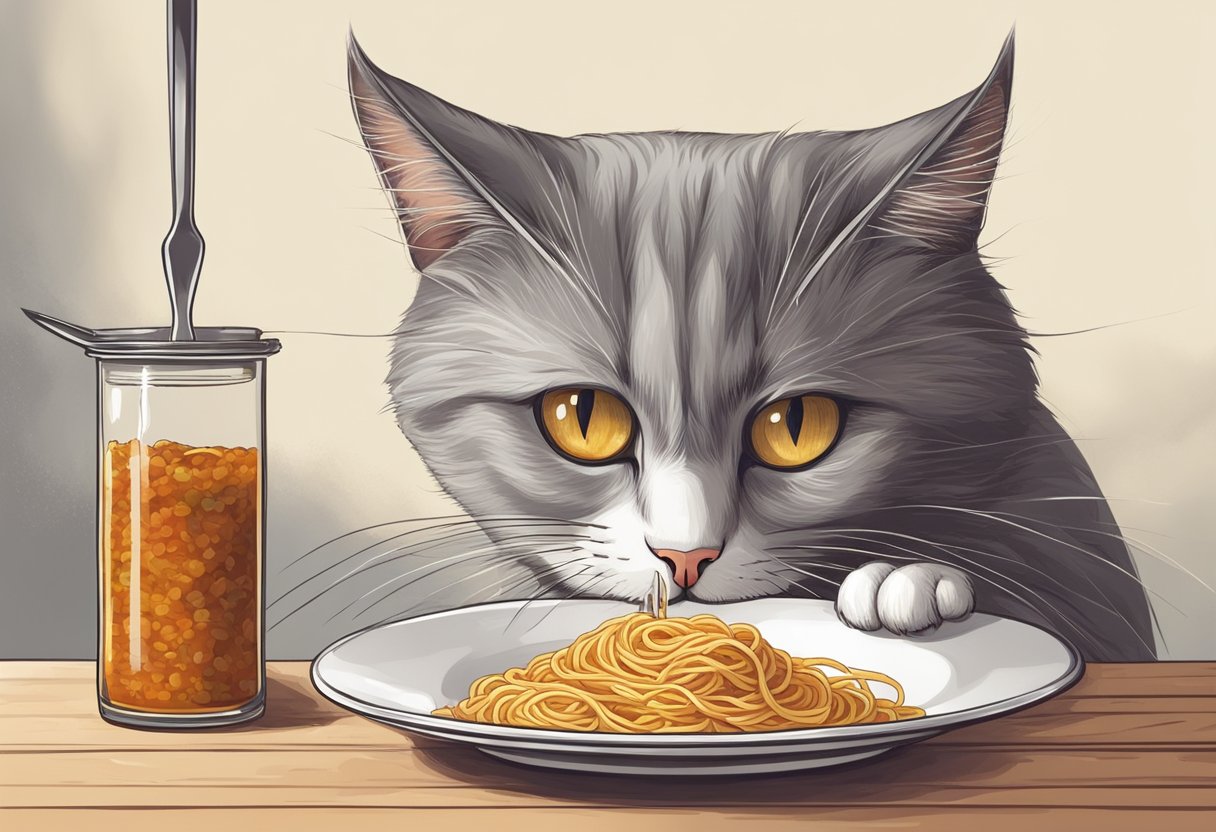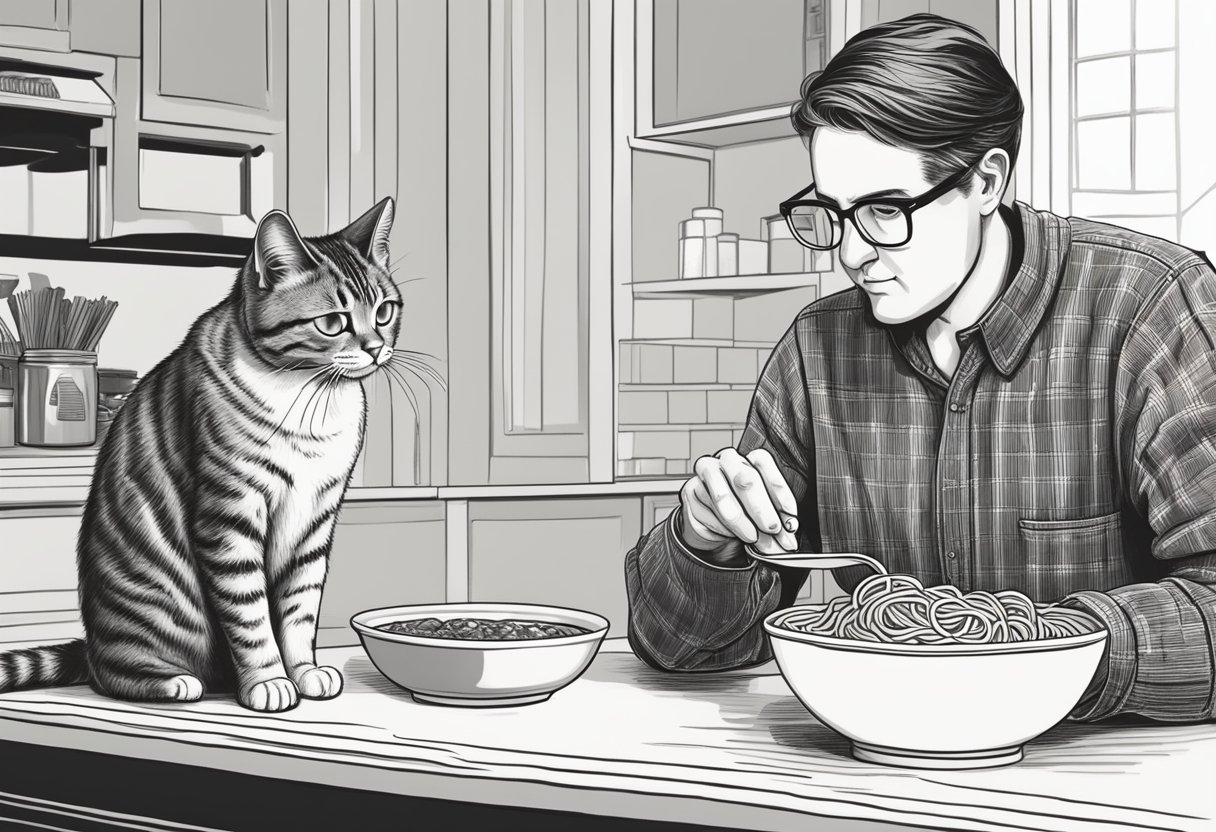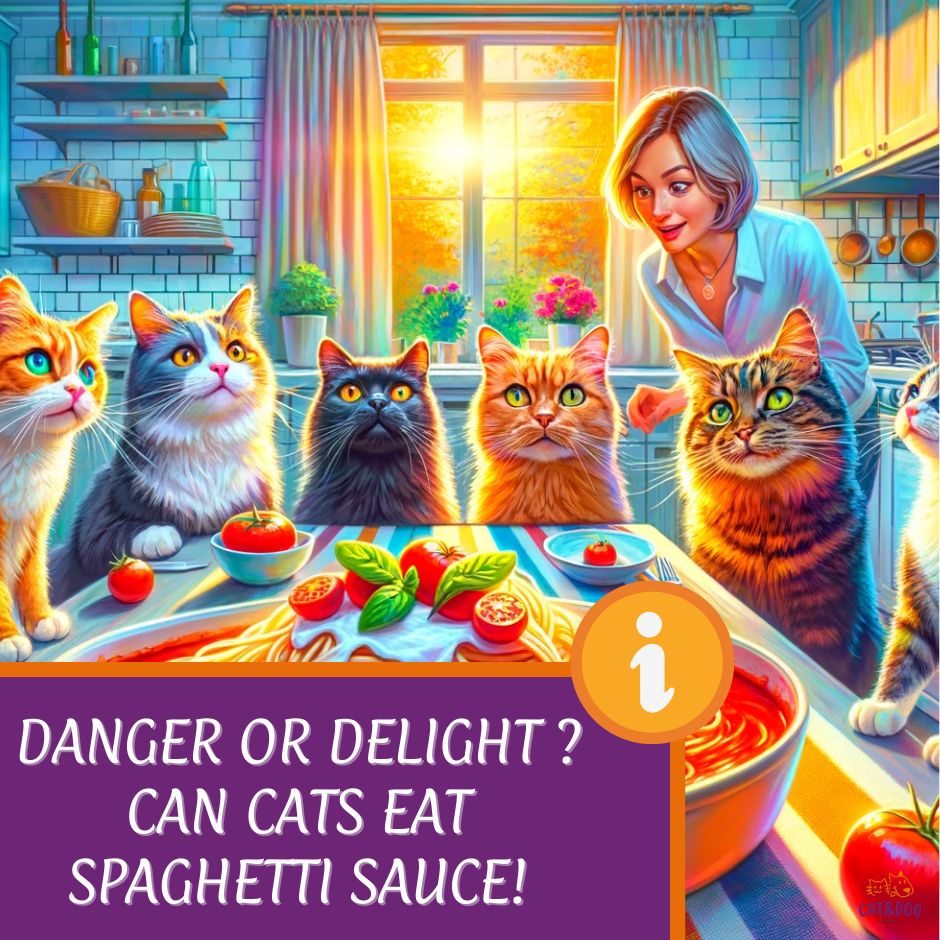Have you ever caught your furry friend eyeing your plate of pasta and wondered, ‘Can cats eat spaghetti sauce?’
It’s a common question among loving pet owners, considering cats’ well-known curiosity about human foods.
While spaghetti sauce is a staple in many diets, understanding what’s safe for your cat is crucial. However, be cautious, as some herbs and spices in the sauce might not be feline-friendly.

While it’s tempting to share a bit of sauce with your whiskered companion, it’s crucial to recognize that what’s delicious for you isn’t always suitable for them.
Cats have different dietary needs and sensitivities, and certain common ingredients in spaghetti sauce can be harmful to them.
The misconception that cats can enjoy human food without repercussions can lead to unintended health issues. So, should you let your kitty indulge in some spaghetti sauce?
The answer is a resounding no. Now that you know what you can safely feed your cat, it’s just as important to find a bowl that supports their health and well-being.
With whisker-friendly bowls and a wide tray to catch any spills, our favorite option is the Hepper NomNom Cat Bowl.
Then what about the pasta, can cats eat pasta?
Key Takeaways
- Spaghetti sauce can contain ingredients harmful to cats, such as garlic and onion.
- Cats derive no nutritional value from spaghetti sauce, and it may lead to toxicity.
- Always ensure your cat’s diet is safe and consult with a vet for appropriate dietary practices.
Nutritional Concerns with Spaghetti Sauce for Cats
While those pleading eyes can be hard to resist, it’s important to consider what’s actually in that sauce. Let me break it down for you and keep it simple.
Toxic Ingredients:
- Onions & Garlic:
These common sauce staples can wreak havoc on your cat’s health. Even in small amounts, they can cause anemia by destroying red blood cells. - Chives & Leeks:
Just like onions and garlic, these relatives are a no-go for your four-legged pals.
Now, other ingredients might not be outright toxic, but they sure aren’t healthy for your whiskered friend:
- High Salt Content:
Cats simply can’t handle too much salt. It can quickly lead to dehydration and might even cause high blood pressure. Let’s avoid a salty situation, shall we? - Sugar & Sweeteners:
Cats don’t have a sweet tooth. Added sugars can lead to obesity and do not offer any nutritional benefits for them. - Spices & Seasonings:
The complex flavors you enjoy can upset your kitty’s stomach. Stick to their kibble to keep their tummy happy.
Caloric Concerns:
A spoonful of spaghetti sauce might not seem like much, but for a cat, it’s a big deal. All those extra, non-nutritive calories can add up, possibly leading to weight gain.
So, when it comes to spaghetti sauce, it’s a generous no for your little carnivore. They’ll be much better off sticking to their balanced diet made just for them. (1)
Given the high risk of toxicity from certain ingredients, spaghetti sauce should be considered among the toxic foods for cats, emphasizing the importance of adhering to a cat-safe diet.
Keep the pasta nights as a human-only treat and consider a cat-friendly alternative for your pet. Your cat’s health thanks you in advance!
Cats are obligate carnivores, so they should get their energy from animal proteins and fats.
Carbohydrates are unnecessary in a cat’s diet and can cause problems with their digestive tract.
Pasta is packed with carbs, so it shouldn’t be a regular product in your feline friend’s diet.
Cats can eat pasta, but it doesn’t provide the essential nutrients that kitties need to thrive.
Additionally, spaghetti is considered to be a source of ’empty calories’ when included in your cat’s diet.
It provides easily digestible energy but does not meet any of the cat’s basic nutritional needs.
Scientific and Veterinary Insights on Cats and Spaghetti Sauce
Let’s take a “paws” and consider what the experts have to say!
Veterinary Concerns:
- Lethargy: Your cat may not be their usual perky self. (2)
- Digestive Upset: Spaghetti sauce can cause an upset stomach resulting in vomiting or diarrhea.
- Toxic Ingredients: Garlic and onions, common in spaghetti sauce, are toxic to cats.
Now, before you think about sharing your dinner, research on cat nutrition highlights the importance of a diet fitting their carnivorous nature.
Cats require nutrients found predominantly in meat and lack the ability to efficiently process high-carb foods like spaghetti sauce.
Here’s what a balanced feline diet should focus on:
- Proteins: The cornerstone of a cat’s diet. (4)
- Fats: Essential, but only in moderation.
- Carbs: Best kept to a minimum.
- Vitamins: A tricky balance – vets can help tailor this! (5)
An interesting snippet from a vet-reviewed source points out that sauce could lead to:
- Obesity and diabetes: Due to high sugar and carb content.
- Heart issues: Spices and salt raise concerns here.
Feeling worried? If your cat has taken a sauce dive, keep an eye out for:
- Increased heart rate
- Respiratory changes
- Color changes in urine
Remember, fresh water is your cat’s best friend after an accidental taste test, and when in doubt, a quick call to the vet is in order.
So, while it might be tempting to share your meal with your kitty, it’s best to stick to feline-approved menus!
Recognizing Symptoms of Toxicity in Cats
If they’ve had a sneaky taste, you might be wondering what symptoms to look out for.
Cats can be sensitive to certain ingredients commonly found in spaghetti sauce like onions, garlic, and even the tomatoes themselves.
Here’s a quick guide to help you spot any trouble if your cat licks a bit of the pasta sauce off of your plate.
Cats can be fine if they just have a small taste, but if they eat quite a bit of the pasta sauce, it’s best to start looking for symptoms of poisoning, such as lethargy, weakness, loss of appetite, and orange to dark red urine.
Immediate Symptoms to Watch For:
- Lethargy: Your usually playful buddy might seem unusually tired and uninterested in their usual antics.
- Weakness: Look out for any changes in your cat’s mobility or strength.
- Poor Muscle Coordination: Stumbling or difficulty jumping could be a sign something’s wrong.
- Hypersalivation: More drool than usual could be a clue. (6)
- Discolored Urine: Keep an eye on the litter box for brown or red urine.
- Digestive Upset: Diarrhea and vomiting are common signs your cat isn’t feeling well.
- Respiratory Issues: Any changes in breathing or heart rate merit immediate attention.
Possible Long-Term Health Risks:
If your cat repeatedly ingests these toxins, it doesn’t just stop at a tummy ache.
We’re talking potential damage to the red blood cells (which can lead to anemia over time), and in severe cases, it might even result in organ damage.
Remember, it’s not just about spotting the signs early—it’s about keeping that sauce well out of paw’s reach in the first place!
Keep this list handy, and if you notice anything amiss, call your vet right away. Your feline friend relies on you to keep their nine lives safe!
Real-Life Anecdotes and Case Studies
Well, you’re not alone! Many cat owners have shared tales where curiosity got the better of their feline pals.
Case Study #1: Miss Whiskers’ Sneaky Taste
- Outcome: Mild digestive upset
- Owner’s Action: Switched to cat-safe treats
In one tale, Miss Whiskers managed to lick some leftover spaghetti sauce when her owner wasn’t looking.
She experienced some gastrointestinal discomfort but was back to her playful self after a quick visit to the vet.
Anecdote from a Cat Owner: The Tomato Sauce Incident
- Cat’s Response: Hypersalivation and lethargy
- Lesson Learned: Keep human food out of paw’s reach
Another cat owner shared a not-so-funny story where their tabby got into a jar of homemade spaghetti sauce.
The poor thing ended up feeling quite unwell, with symptoms like drooling and unusual sluggishness.
| Cat’s Name | Experience with Spaghetti Sauce | Owner’s Observation |
| Buddy | Licked sauce off a spoon | Noticed increased thirst and avoidance of food |
| Cleo | Ate spaghetti sauce with ground beef | Brief curiosity followed by disinterest |
These stories serve as a reminder that while it may seem harmless to let your cat try a bit of your food, it’s better to stick to treats made specifically for them.
Not only can certain ingredients in spaghetti sauce, such as solanine, be harmful to cats, but they also don’t provide the nutritional value your cat needs.
So, next time you’re enjoying your spaghetti dish and feel tempted to share, consider offering a catnip treat instead and save the sauce for yourself!
If spaghetti sauce is consumed in large amounts, your cat will not receive the essential nutrients they need to stay fit and healthy.
Deficiencies of essential vitamins and minerals can occur, leading to medical problems.
Safe Dietary Practices and Alternatives

While it’s tempting to share, it’s important to remember that spaghetti sauce isn’t the best choice for our feline friends.
So, what’s a health-conscious cat owner to do to ensure their cat’s physical health and receive high-quality veterinarian care?
Healthy Treats for Your Cat
Instead of sharing your pasta sauce, why not offer some safe and healthy treats? Here are a few kitty-approved options:
- Cooked Meat:
A small amount of cooked chicken or turkey can be a fantastic treat. - Fish:
Cats often go wild for fish. Tuna or salmon, served cooked and plain, can be a real kitty-pleaser.
Just make sure it’s free of any added flavors or sauces.
Avoiding Accidental Ingestion
It’s also crucial to prevent accidental ingestion of foods that could be harmful to your cat. Here are a couple of quick tips to keep your kitty safe:
- Food Storage:
Always store human food out of your cat’s reach. - Clear Plates:
Don’t leave leftovers unattended on your plate—those little paw burglars are quick!
Giving your cat a small portion of cat-appropriate healthy food, such as biscuits, can make mealtime fun for both of you.
Remember, your cat relies on you for their health and happiness, so keep their snacks plain and simple.
With these tips, you can enjoy your meal and know that your fur baby isn’t missing out – they’re eating right alongside you, just in a cat-tastic way!
Quick Recap

Remember, cats are obligate carnivores, which means their bodies are designed to digest meat, not human foods.
- Tomato Base:
Natural tomatoes in small quantities aren’t toxic to cats, but… - Onions & Garlic:
These common ingredients are a no-go, potentially causing digestion issues and even toxic reactions. - Salt & Sugar:
High amounts of these in sauces can lead to health issues over time. - Dairy:
Some sauces contain cheese or cream—lactose is often a feline foe. - Seasonings & Preservatives:
Many are unfamiliar to a cat’s digestive system and can lead to illness.
So, what’s the verdict on sharing your saucy dish with your whiskered companion? It’s a thumbs down. Your pasta might be purr-fect for you, but not for your cat.
Here’s what you should remember:
- Avoid Feeding Spaghetti Sauce: It’s not worth the risk of gastrointestinal upset or worse.
- Stick to Cat Food: Tailor-made for their nutritional needs without the problematic ingredients.
- Treats? Go For Cat-Safe Options: There are plenty of delicious, healthy treats made just for cats.
Keep your culinary experiments to yourself, and let your cat keep loving their cat-specific diet. They’ll thank you with purrs and cuddles, sans tummy troubles!
Frequently Asked Questions

When it comes to the safety of your furry companion and spaghetti sauce, you might have a few questions. Let’s clear up the confusion with some straightforward answers.
Is Spaghetti Sauce Safe for Cats to Eat?
No, spaghetti sauce is not safe for cats. Traditional recipes contain several ingredients that could be harmful to your pet.
What Ingredients in Spaghetti Sauce are Toxic to Cats?
Onions and garlic are particularly toxic to cats, as they contain compounds that can destroy red blood cells and lead to anemia.
Other herbs and spices commonly found in spaghetti sauce might also be harmful.
Can Cats Have Tomato-Based Foods?
While ripe tomatoes are less harmful, tomato-based foods like spaghetti sauce often contain additional ingredients that are not safe for cats.
So, it’s best to keep them away from any tomato-based dishes.
What Are the Signs of Toxicity in Cats After Eating Spaghetti Sauce?
Watch for signs of weakness, lethargy, pale gums, and reduced appetite. These symptoms could indicate anemia from toxicity.
How Much Spaghetti Sauce Can Harm a Cat?
Even small amounts of spaghetti sauce could potentially be harmful due to the concentration of toxic ingredients like onion and garlic.
Are There Any Non-Toxic Alternatives to Spaghetti Sauce for Cats?
You can create a cat-safe alternative using only pet-friendly ingredients. But remember, cats don’t need human foods in their diet.
How Should I Respond if My Cat Ingests Spaghetti Sauce?
Immediate action is crucial. Contact your vet or an emergency pet poison hotline if you suspect your cat has ingested spaghetti sauce.
Prompt attention could make all the difference.
- Pinqo Anlayışının Bilinməyən On İki Tərəfi və İstifadə Sahələri None - August 5, 2025
- Pinqo Anlayışının Bilinməyən On İki Tərəfi və İstifadə Sahələri None - August 5, 2025
- Pinco Bet saytına giriş üçün Google ilə güncəl güzgü linkini tapın - August 5, 2025


